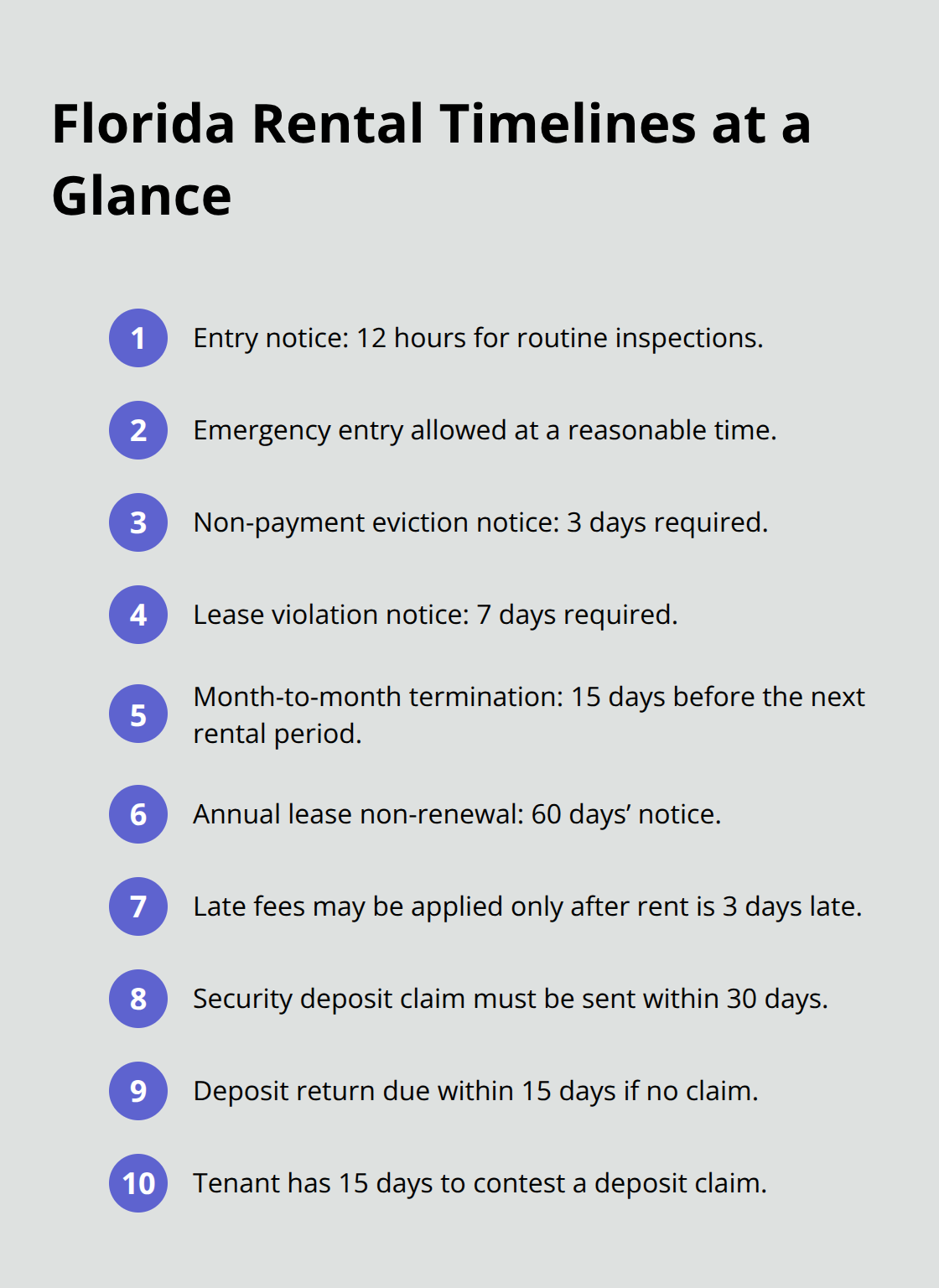Landlord Legal Advice: Know Your Rights and Obligations
Our Blog
Landlord Legal Advice: Know Your Rights and Obligations

Property ownership in Melbourne Florida comes with significant legal responsibilities that many landlords overlook. Florida’s landlord-tenant laws contain specific requirements for rent collection, property maintenance, and tenant relations.
We at Harnage Law PLLC see landlords face costly mistakes when they lack proper legal advice on landlords’ rights and obligations. Understanding these laws protects your investment and prevents expensive litigation.
Understanding Landlord Rights in Melbourne Florida
Florida Statute Chapter 83 grants landlords substantial rights that many property owners fail to exercise properly. Landlords can enter rental properties with 12 hours written notice for inspections, repairs, or tenant showings. This notice period drops to reasonable time for emergencies that involve immediate danger to persons or property. Smart landlords schedule quarterly inspections to catch maintenance issues early and document property conditions through photos and written reports.
Property Access Without Tenant Interference
Tenants cannot legally refuse reasonable entry requests in Florida. Landlords who face tenant resistance should document refusal attempts and proceed with entry after proper notice. Florida courts consistently side with landlords who follow statutory notice requirements. Properties with lease violations or suspected illegal activities allow for immediate inspection without advance notice when safety concerns exist.
Rent Collection and Late Fee Authority
Florida law permits landlords to charge late fees up to 5% of monthly rent or $50 (whichever is greater), provided lease agreements specify these terms. Landlords must wait until rent is 3 days late before they apply fees. The most successful landlords implement automatic late fee policies and never waive them, as inconsistent enforcement weakens legal standing in eviction cases. Online rent collection systems reduce late payments by 23% according to the National Multifamily Housing Council.
Tenant Selection Without Legal Risks
Landlords maintain complete discretion in tenant selection provided they avoid protected class discrimination. Income requirements of three times monthly rent, credit scores above 650, and employment verification for 24 months represent standard criteria. Consistent application of identical standards to all applicants prevents Fair Housing Act violations. Landlords who use written criteria and document decision reasons avoid 89% of discrimination claims compared to those who use informal selection methods.
These rights form the foundation of successful property management, but landlords must balance them with equally important legal obligations that Florida law mandates. Understanding these rights helps prevent common landlord/tenant disputes that can escalate into costly legal battles.
Key Landlord Obligations Under Florida Law
Florida landlords face strict legal obligations that carry significant financial penalties when violated. Property maintenance requirements under Florida Statute Chapter 83 mandate functional plumbing, electrical systems, heating, and structural integrity at all times. Landlords must respond to habitability issues within 7 days of tenant notice or face rent withholding actions. The Florida Department of Agriculture and Consumer Services reports that 34% of tenant complaints involve maintenance failures, which makes this the top liability risk for property owners.
Property Maintenance and Safety Requirements
Florida law places the burden of property habitability squarely on landlords’ shoulders. Landlords must maintain working plumbing systems, electrical wiring that meets code standards, and heating systems that function properly throughout the lease term. Structural problems like roof leaks, foundation cracks, or pest infestations require immediate attention once tenants report them. Courts consistently rule against landlords who delay repairs beyond the 7-day statutory window (even when tenants continue to pay rent).
Security Deposit Handling and Return Procedures
Florida law requires landlords to hold security deposits in separate non-interest accounts or post surety bonds up to $50,000 with the circuit court clerk. Landlords must notify tenants within 30 days about deposit location and procedures. Upon lease termination, deposits must be returned within 15 days unless landlords send written claims within 30 days that specify damage reasons.

Tenants have 15 days to contest claims in written form. Landlords who mix deposits with personal funds face automatic liability for the full deposit amount plus damages. Interest accounts require payment of 75% of annual interest or 5% simple interest annually to tenants.
Proper Notice Requirements for Lease Termination
Lease termination notices must follow precise time requirements that vary by lease type. Month-to-month tenancies require 15 days written notice before the next rental period begins. Annual leases need 60 days advance notice for non-renewal decisions.

Landlords who provide insufficient notice automatically extend tenancy terms under Florida law. Entry notices require 12 hours for routine inspections and reasonable time for emergencies. Eviction proceedings demand 3-day notices for non-payment and 7-day notices for lease violations. Courts dismiss eviction cases when notices contain time errors, which costs landlords months of lost rent and legal fees.
These obligations create a complex legal framework that landlords must navigate carefully. Violations often lead to the most challenging situations property owners face in Melbourne Florida.
Common Legal Issues Landlords Face
Eviction proceedings represent the most expensive legal mistake landlords make in Melbourne Florida. The Florida Department of Business and Professional Regulation tracks that 67% of failed evictions result from improper documentation or notice errors. Landlords must serve 3-day notices for non-payment that specify exact amounts owed and 7-day notices for lease violations that detail specific infractions. Courts dismiss cases when notices contain mathematical errors, wrong tenant names, or insufficient time calculations.

Smart landlords photograph service attempts, use certified mail with return receipts, and maintain detailed records of all tenant communications. The average eviction costs $3,500 in legal fees and lost rent when landlords make procedural mistakes.
Eviction Process and Documentation Requirements
Successful evictions require meticulous record maintenance that many landlords ignore until litigation begins. Courts expect landlords to produce lease agreements, payment histories, maintenance requests, and all written communications with tenants. Digital photos of property conditions with timestamps strengthen damage claims significantly. Landlords who use property management software report 45% fewer eviction dismissals compared to those who use paper records (according to the National Association of Residential Property Managers). Text messages and emails must be preserved as they constitute legal notice under Florida law. Courts automatically weaken landlords’ positions when documentation goes missing and often dismiss cases entirely.
Discrimination Claims and Fair Housing Compliance
Discrimination claims can cost landlords $100,000 or more in federal penalties and legal fees. The Fair Housing Act prohibits discrimination based on race, color, religion, sex, national origin, familial status, and disability. Landlords who ask about pregnancy plans, refuse service animals, or make comments about tenants’ backgrounds face automatic liability. Consistent application of written tenant criteria prevents 94% of discrimination claims. Landlords must provide reasonable accommodations for disabled tenants and cannot charge pet deposits for service animals. Property insurance rarely covers discrimination settlements (which makes prevention the only viable strategy for protection).
Property Damage and Insurance Coverage Disputes
Property damage disputes arise when landlords and tenants disagree about normal wear versus tenant-caused damage. Florida law defines normal wear as deterioration from ordinary use without negligence or abuse. Carpet replacement after 5-7 years constitutes normal wear, while burn marks or pet stains represent tenant damage. Landlords must document pre-existing conditions through move-in inspections with photos and written reports. Insurance companies often deny claims for gradual damage or tenant-caused destruction, which leaves landlords financially responsible. Professional property inspections cost $200-400 but prevent thousands in disputed damage claims.
Final Thoughts
Successful property management in Melbourne Florida requires landlords to balance their rights with legal obligations under Florida Statute Chapter 83. Property owners can collect rent with late fees, conduct inspections with proper notice, and select tenants through consistent criteria. However, landlords must maintain habitable conditions, handle security deposits in separate accounts, and follow precise eviction procedures.
The most costly mistakes involve improper documentation during evictions, discrimination violations, and maintenance delays. Courts dismiss 67% of failed evictions due to procedural errors, while discrimination claims can result in $100,000 penalties (making prevention the only viable protection strategy). Property owners who maintain detailed records, respond to habitability issues within 7 days, and apply tenant criteria consistently avoid most legal problems.
Legal advice on landlords becomes necessary when facing eviction proceedings, discrimination claims, or complex property disputes. We at Harnage Law PLLC provide legal representation for landlords who navigate Florida’s complex rental laws. Professional legal guidance protects your investment and prevents expensive litigation that can cost thousands in lost rent and legal fees.
